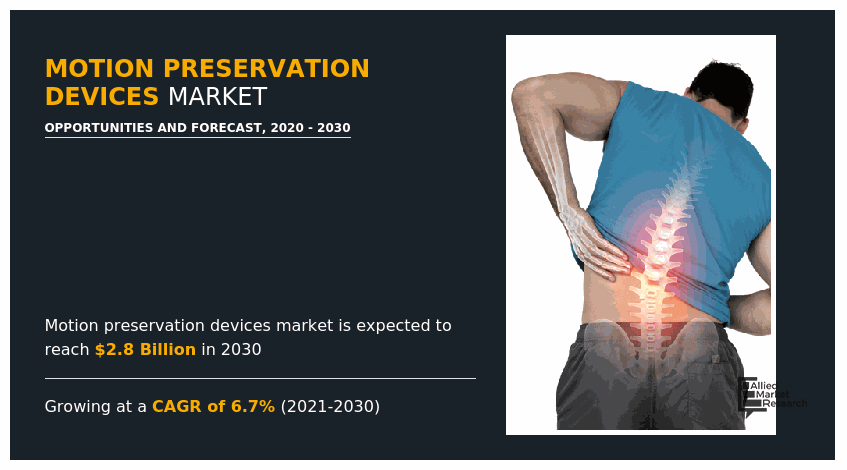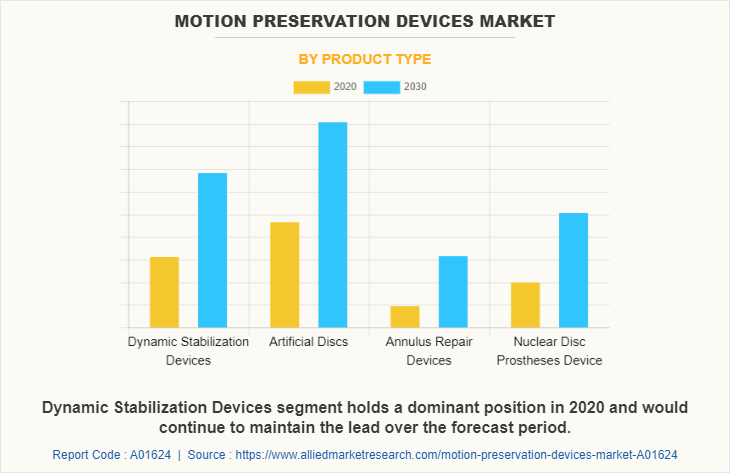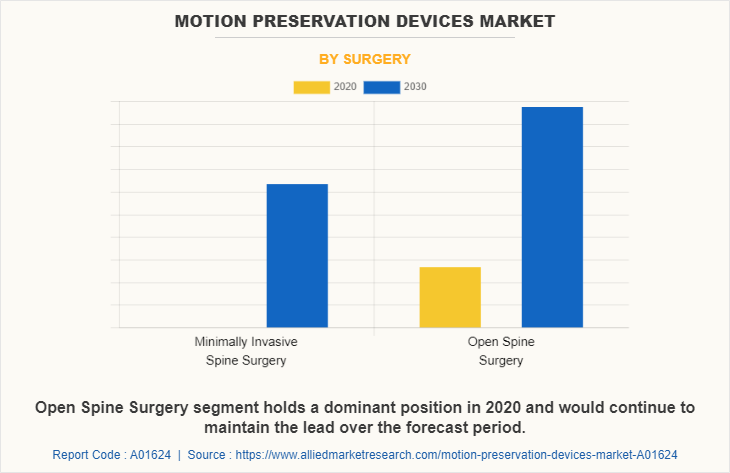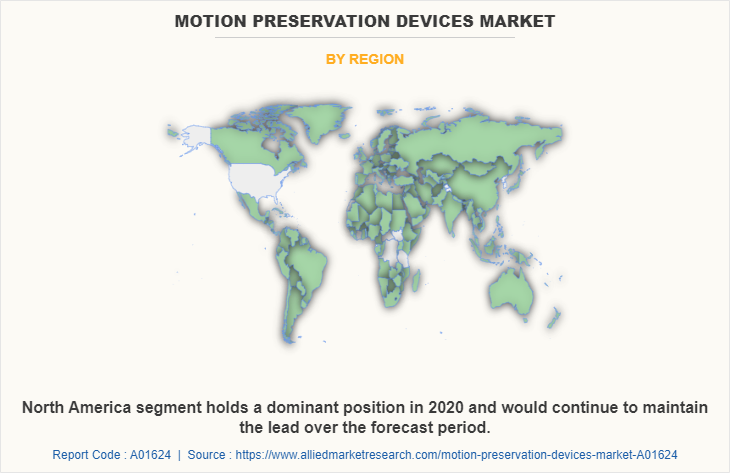Motion Preservation Devices Market Research, 2030
The global Motion Preservation Devices Market sizewas valued at $1.5 billion in 2020, and is projected to reach $2.8 billion by 2030, growing at a CAGR of 6.7% from 2021 to 2030.
Motion preservation devices are used to treat disorders associated with the spine. These devices are used to restore and maintain the normal alignment of the spine. However, unlike spinal fusion, motion preservation devices act to preserve the natural motion of the spine. The motion preservation devices are of two types including artificial disc and dynamic stabilization devices. The characteristic of the motion preservation device includes preservation of spinal motion, reducing the need for revision recovery, quick recovery time, and technological innovation.The stainless steel artificial disc allows continuous natural spine rotation while simultaneously providing relief & treatment to the target area.It helps to restore the motion of the spine, which has led to increasing in the adoption of these surgical devices. There are four types of technologies used for the treatment of posterior motion preservation of degenerative lumbar spine, including the total disc replacement, disc nucleus replacement, interspinous process spacers, posterior dynamic stabilization devices, and facet replacement devices

The key factor that drives motion preservation devices market growth is a rise in the geriatric population and favorable demographics across the globe. Moreover, advanced motion preservation devices can be handled more conveniently and have a higher level of sensitivity compared to conventional diagnostic testing techniques. Furthermore, the preference for minimally invasive spine surgery over traditional open surge treatment procedures accelerates the motion preservation device market growth. Therefore, reduced length of hospital stay is a significant factor in the shift toward MIS minimally invasive surgery. In addition, the comparatively low cost of minimally invasive surgical procedures is another factor, which drives the growth of the spine implants market. Moreover, an increase in the global geriatric population and a rise in the number of spine disorders are projected to boost the segment during the forecast period. An increase in demand for motion preservation devices, due to the inclination toward minimally invasive procedures, is a key factor that is anticipated to drive the market during the forecast period. In addition, awareness among patients about the benefits of motion preservation devices provides a motion preservation devices market opportunity.
The aim of the motion preservation devices is to be able to keep the normal or near regular motion to stem the adverse impact of spinal infusion. An ideal motion preservation device is basically a minimally invasive procedure, it preserves or re-establish the normal motion of the spine. The spinal disorder is most common in the geriatric population. Due to aging, there are structural changes in the spine such as enlargement in the bone & joints and thickening of the band of tissue that supports the spine. There are a wide variety of posterior motion preservation devices in various stages of development.
The outbreak of the COVID-19 pandemic has had a profound effect on the overall growth of the global motion preservation device market. With several countries and regions placed under strict lockdowns, the production and logistics of the motion preservation devices have taken a massive hit. More importantly, with the rising number of cases, detection and treatment of the COVID-19 virus have taken increased precedence over others. Naturally, the use of these devices has witnessed a slight fall during the peak months of the pandemic outbreak. However, the situation is about to resume back to the normal as the vaccine production is on the way
The motion preservation devices market is segmented on the basis of product type, surgery, and region. According to the product type, it is segmented into dynamic stabilization devices, artificial disc replacement devices, annulus repair devices, and nuclear disc prostheses devices. Based on the type of surgery, the market is segmented into open spine surgery and minimally invasive spine surgery. Region-wise, it is analyzed across North America, Europe, Asia-Pacific, and LAMEA
Segment Review By Product Type

By product type, the artificial discs segment dominated the global motion preservation devices market, owing to an increase in the global geriatric population and a rise in the number of spine disorders are projected to boost the segment during the forecast period. An increase in demand for motion preservation devices, due to the inclination toward minimally invasive procedures, is a key factor that is anticipated to drive the market during the forecast period.
Segment Review by Surgery

By surgery type, the market is segmented into open spine surgery and minimally invasive spine surgery. The open spine surgery segment was the highest contributor in 2020. The reduced cost of the surgery and hospitalization are the factors that drive the growth of this market. Furthermore, an increase in the adoption of novel and technologically advanced techniques, such as minimally invasive spine surgery, drives the growth of the market in upcoming years
Region segment review

Region-wise, the market is analyzed across North America, Europe, Asia-Pacific, and LAMEA. The North America region has the highest motion preservation devices market share. The Asia-Pacific market is projected to grow at a significant CAGR of 8.0% during the forecast period, owing to an increase in the prevalence of spinal cord deformities and injuries. The majority of the companies and vendors in this region have focused on product development to serve a dual purpose to mitigate the disability rate caused due to spinal injuries and survive the intense competition.
The key market players for motion preservation devices industry include Aurora Spine Corporation, B. Braun Melungeon AG, Globus Medical, Inc., HPI Implants, Johnson & Johnson, Paradigm Spine, LLC RTI Surgical, Inc., Spinal Kinetics, Inc., Ulrich GmbH & Co., KG, and Zimmer Biomet Holdings, Inc.
The motion preservation devices market is segmented into Surgery and Product Type.
Key Benefits For Stakeholders
- This report provides a quantitative analysis of the market segments, current trends, estimations, and dynamics of the motion preservation devices market analysis from 2020 to 2030 to identify the prevailing motion preservation devices market opportunities.
- The market research is offered along with information related to key drivers, restraints, and opportunities.
- Porter's five forces analysis highlights the potency of buyers and suppliers to enable stakeholders make profit-oriented business decisions and strengthen their supplier-buyer network.
- In-depth analysis of the motion preservation devices market segmentation assists to determine the prevailing market opportunities.
- Major countries in each region are mapped according to their revenue contribution to the global market.
- Market player positioning facilitates benchmarking and provides a clear understanding of the present position of the market players.
- The report includes the analysis of the regional as well as global motion preservation devices market trends, key players, market segments, application areas, and market growth strategies.
Motion Preservation Devices Market Report Highlights
| Aspects | Details |
| By Surgery |
|
| By Product Type |
|
| By Region |
|
| Key Market Players | Ulrich GmbH & Co. KG, Aura Spine Incs, Raymedica, Inc, Paradigm Spine, RTI Surgical, Inc, GlobusMedical, Inc, Zimmer Biomet, B. Braun Melunsung, HPI Implants, Spinal Kinetics, Inc |
Analyst Review
According to CXOs, the companies operating in the global motion preservation devices market. Based on the interviews conducted, the adoption of motion preservation devices is expected to increase in the future, due to advancements in surgical options and rise in the incidence rate of spinal impairments across the globe. The motion preservation devices market has piqued the interest of healthcare professionals, owing to the increase in the use of these devices for the treatment of spinal deformities. Furthermore, the advent of better spine surgery treatment options drives the market growth. Most of spine surgeons prefer minimal invasive surgical techniques for a wide range of motion preservation spine procedures, due to lesser complications associated with the procedure, reduced length of hospital stay, and less bleeding. However, unfavorable reimbursement scenarios and stringent regulatory approval procedures are expected to hamper the market growth. As per the CXOs, the use of these motion preservation devices is the highest in North America, owing to heavy expenditure by the government on healthcare and supportive reimbursement policies. It is followed by Europe and Asia-Pacific, respectively.
$1,466.74 Million is the estimated industry size of Motion Preservation Devices Market in 2020
$ 2,807.43 Millionis the estimated industry size of Motion Preservation Devices Market in 2030
The upcoming trends of the Motion Preservation Devices Market are an increase in prevalence of spinal disorder, the surge in a change in lifestyle, and technological advancements in the motion preservation device market driving the market growth.
North America is the largest regional market for Motion Preservation Devices Market
Aurora Spine Corporation, B. Braun Melsungen AG, Globus Medical, Inc. HPI Implants Johnson & Johnson, Paradigm Spine are the top companies to hold the market share in Motion Preservation Devices Market
Loading Table Of Content...



